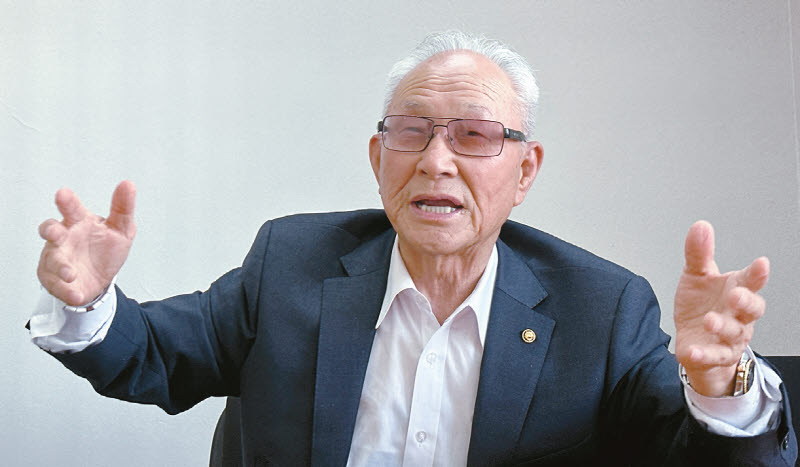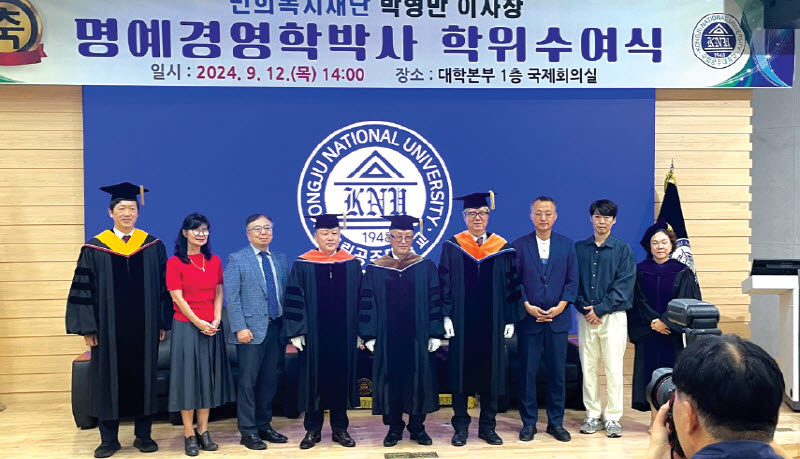On September 12, Park Hyung-man (87), chairman of the Manhee Koju Foundation, was awarded an honorary Doctor of Business Administration from Gongju National University. The ceremony was attended by various dignitaries from the city of Gongju and South Chungcheong Province, who applauded Park’s recognition.
Park, a prominent philanthropist known for his annual contributions to support the underprivileged in his hometown, is often referred to as one of Gongju’s “Three Parks,” alongside baseball legend Chan-ho Park and golf icon Seri Pak. His long-standing efforts to assist the less fortunate have earned him widespread gratitude from the community.
On September 13, Park visited Gongju City Hall to distribute 1 million won ($747) each to 40 socially disadvantaged individuals, including orphaned children, people with disabilities, and elderly individuals living alone. This marks the 28th consecutive year of Park’s heartfelt commitment to supporting his hometown.

Park’s deep-rooted dedication to helping others stems from his own experience of poverty. “I was born as the youngest of 10 siblings, and back then, everyone was poor,” he said. “The hunger I felt in Gongju as a 12 or 13-year-old is something I’ll never forget. As someone who grew up here, I’ve always wanted to help those in need.”
At 27, Park was forced to drop out of Konkuk University’s political science and diplomacy program due to financial hardship. Returning to his hometown, he taught soccer at a local agricultural high school before volunteering to work in Germany as a coal miner. From 1964, he spent three years 1,000 meters underground in the Essen region, mining coal. But during his time there, he also learned valuable lessons in diligence and frugality from the Germans, which he credits with “reinventing his life.”
“German people are simple, hardworking, and honest,” Park said. “I learned how to live life from them. That’s why, after mining coal for eight hours, I would also take on extra work at nearby farms.”
In Germany, Park married Lee Sook-hee (86), who was working there as a nurse. The couple moved to Los Angeles in 1967, where they began their journey to financial independence. Park worked various jobs, including dishwashing, shoe repair, and gardening, while his wife diligently saved her earnings from nursing. Their first real estate investment in 1972—a 12-unit apartment in LA’s Koreatown—was the foundation of their success, eventually leading to substantial wealth.
Despite their financial success, Park and his wife are known for their modest lifestyle, with some even jokingly calling them “stingy.” Park acknowledges this with a smile. “People say I spend money like a Jew, but I believe in knowing where to spend and where not to. This keeps me humble.”

Park avoids spending on material luxuries, instead choosing to donate to those in need. His philanthropy has expanded beyond Gongju, with 30 homeless individuals in LA receiving $1,000 annually for the past decade.
He has also been a donor to the Children’s Hospital Los Angeles for the past five years and, in June, contributed $50,000 to support 40 vulnerable individuals at the LA Koreatown Senior & Community Center. According to the Manhee Koju Foundation, Park and his wife have donated a total of $1.3 million to support communities in Gongju and LA.
“When I first started donating to my hometown 28 years ago, I had moments of doubt,” Park admitted. “I flew economy to meet the people back home, and one elderly woman tearfully told me she no longer had to worry about surviving the winter. That’s when I knew I was doing the right thing.”
Park emphasizes that his actions are guided by an inner calling. “Helping others is where I feel the presence of God. It’s like a tonic for my soul. Having been born into poverty as the youngest of ten siblings, I’ve worked hard to overcome it—and now I want to extend my hand to those around me.”
BY HYOUNGJAE KIM, YOUNGNAM KIM [kim.ian@koreadaily.com]




